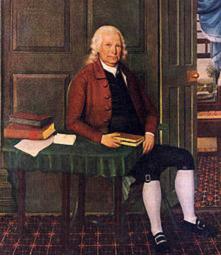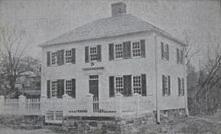
Origins of Phillips Exeter Academy
USINFO | 2013-12-06 14:45

John Phillips, the founder of Phillips Exeter Academy
Phillips Exeter Academy was established in 1781 by the merchant, banker, and public servant Dr. John Phillips and his wife Elizabeth. John was a great-grandson of the Rev. George Phillips, first minister of Watertown, Massachusetts and founder of the Congregational Church in America, who arrived on the shipArbella with Governor Winthrop in 1630. John Phillips had made his fortune as a merchant and banker before going into public service, and played a key role in financially supporting his nephew Samuel Phillips found and write the charter for his own school in Andover, Massachusetts three years earlier. The school that Phillips founded at Exeter was to educate students under a Calvinist religious framework. However, like his nephew who founded Andover, Phillips stipulated in the school's founding charter that it would "ever be equally open to youth of requisite qualifications from every quarter."
Phillips had previously been married to Sarah Gilman, wealthy widow of Phillips's cousin, merchant Nathaniel Gilman, whose large fortune, bequeathed to Phillips, enabled him to endow the Academy. The Gilman family also donated to the Academy much of the land on which it stands, including the initial 1793 grant by New Hampshire Governor John Taylor Gilman of the Yard, the oldest part of campus; the academy's first class in 1783 boasted seven Gilmans. In 1814, Nicholas Gilman, signer of the U.S. Constitution, left $1,000 to Exeter to teach "sacred music."
John Phillips was also the uncle of Samuel Phillips, Jr., who had founded Phillips Academy in Andover, Massachusetts, in 1778. As a result of this family relationship, the two schools also share an academic rivalry to match their athletic one.
The Academy's first schoolhouse, the First Academy Building, was built on a site on Tan Lane in 1783, and today stands not far from its original location. The building was dedicated on February 20, 1783, the same day that the school's first Preceptor, William Woodbridge, was chosen by John Phillips. One of the Trustees, the Reverend David McClure, of North Hampton, N. H., delivered a speech on the "Advantages of an Early Education," drawing parallels between Greece and Rome on one hand and the new American republic on the other, and emphasized the role of education in upholding the new nation.
Exeter's Deed of Gift, written by John Phillips at the founding of the school, emphasizes that Exeter's mission is to instill in its students both goodness and knowledge:

First Academy Building c. 1910, where the school opened in 1783
"Above all, it is expected that the attention of instructors to the disposition of the minds and morals of the youth under their charge will exceed every other care; well considering that though goodness without knowledge is weak and feeble, yet knowledge without goodness is dangerous, and that both united form the noblest character, and lay the surest foundation of usefulness to mankind."
At the opening assembly of every school year, the Principal of the Academy speaks on the subject of the Deed of Gift and its continuing relevance. In this same spirit, the greatest responsibilities to which the faculty and administration hold the students accountable are those of honesty and academic diligence.
In 1859, authors Austin J. Coolidge and John B. Mansfield wrote of Exeter's graduates:
"Such a galaxy of names as appear upon the catalogue of this institution will not, perhaps, be found in connection with any other academy on this continent."
Share this page



















